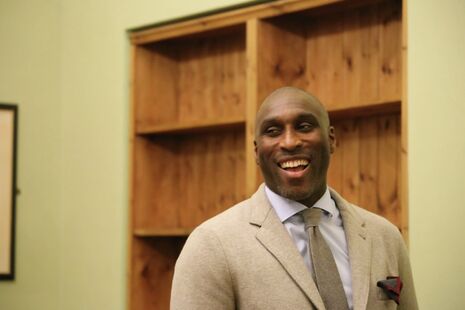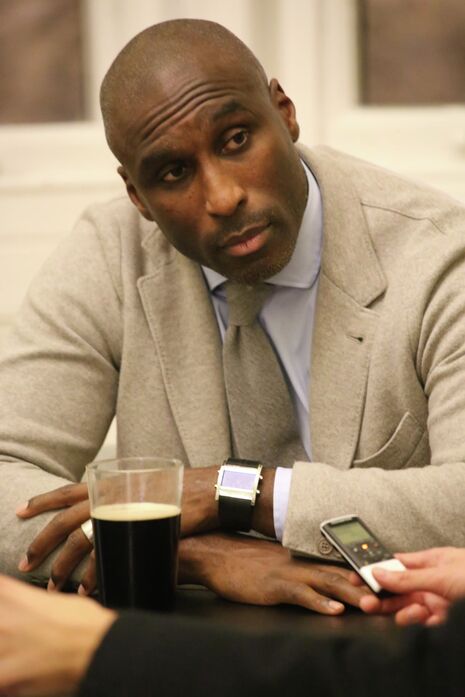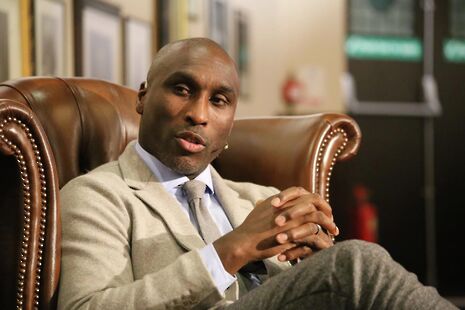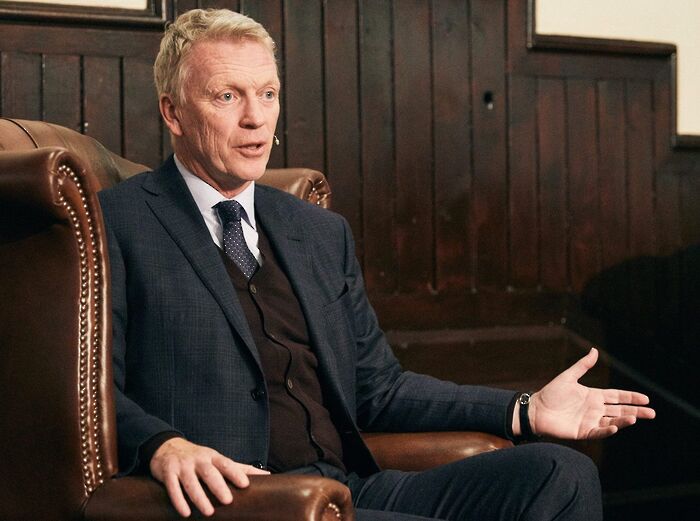Sol Campbell’s first foray into management: “There’s going to be bumps in the road, but it’s a challenge I’m willing to take”
Before the official announcement of his first managerial position at Macclesfield Town, Sol Campbell spoke to Marcus McCabe about his years-long wait for a chance in the dugout

Sol Campbell’s first managerial job has been a long time coming. The commanding centre-half picked up 73 caps for England and enjoyed a glittering playing career spanning 20 years, reaching the Champions League final, winning the Premier League twice with Arsenal and starting at centre in the Gunners’ record breaking Invincibles Season.
However, since completing his UEFA Pro License coaching badge he has struggled to find a manager’s job. Cutting an increasingly frustrated figure, he described himself as “one of the greatest minds in football” after missing out on the Oxford United job earlier this year.
“I had kids, family, and was really, really looking hard over the last 18 months to two years...and then in football opportunities come and people talk, and things fall into place”
Finally, this Tuesday it was announced that Sol Campbell would be taking the hot-seat at League Two Macclesfield Town. When I talked to Sol the day before the news had become official, he explained, “It’s all about negotiation and agents and you know how things go, so hopefully something can be concluded soon.” He had the self-confident air of a man who knows that he finally has a chance to prove himself.
Pint of Guinness in hand, he reflected, “It’s been a long, long journey.”
“I did get an offer years ago, about 34, 35, to join a club as player-manager. And at the time I thought, well I can still play. So, I kind of discounted it. In hindsight, maybe that would have been a better way of getting into a club.”

But watching younger ex-players like Frank Lampard and Gary Neville walk into high-profile jobs hasn’t deterred Campbell from working hard to find the right opportunity: “I studied for three and a half years and then that came in [the Macclesfield job]. I had kids, family, and was really, really looking hard over the last 18 months to two years...and then in football opportunities come and people talk, and things fall into place.”
“It’s going to be a hard, hard scenario – there’s going to be bumps in the road, but it’s a challenge I’m willing to take. I want to see what I can do, build a team together, and give it our best shot. Roll your sleeves up, get your hands dirty and also be a bit smart: when you haven’t got massive budgets, you’ve got to train more, look at detail and you haven’t got money to waste.”
“Roll your sleeves up, get your hands dirty and also be a bit smart: when you haven’t got massive budgets, you’ve got to train more, look at detail and you haven’t got money to waste”
In the build-up to his appointment, Campbell has taken on a range of coaching roles, most recently helping out coaching at the England U21 training camp which he says has provided invaluable experience. “I think going away with England only last week was great for me to see behind the scenes and what’s happening with the up-and-coming youth – the guys who hopefully take over in four or five years’ time.”
As a fly on the wall at St George’s Park, he sees a very high level of footballer but a barrier to first-team starting-berths and the final stages of development. The younger age groups have been “winning European cups, getting into finals, winning world cups. From 17-21 it’s been fantastic over the last three years, four years.”
“But it gets to the U21 level and if the player’s at a premiership club, it’s getting difficult to break in and have that regular slot. It’s like you have to be ready made at 18: strong, quick, skilful, scoring goals, great defender, amazing keeper – which shouldn’t be the case.”

With an obvious parallel between England’s talent of tomorrow struggling to get onto that first rung of the Premier League ladder and Campbell’s own struggles to get managerial experience, it is no wonder that he is passionate about finding a solution. The TV money pouring seemingly inexhaustibly into the coffers of Premier League clubs has produced an influx of foreign players that has made the paths of English youngsters more competitive in the last decade, and so the England national team have had to adapt.
In this vein, Campbell said: “It’s more England Club. So, it’s getting the players in, and sometimes the players are not playing all the time in their first teams. They help them, they encourage them, they give them confidence, they know they’re quality players…they’re saying you are our future and we know what you can do and we’re going to stick by you.”
Noting how difficult it is for English players to make it in the Premier League, in the past Campbell has openly spoken in favour of Brexit and “taking back control of the game we love”. He hopes for more regulation of the numbers of foreign players within the League: “We don’t know what’s going to happen when it comes down to freedom of movement. I think for me when you look at it, I think they should raise the international level.” Currently football players need to have played in at least 75% of their country’s senior international matches over the previous two years to play in the UK, which Campbell thinks is likely to rise. “I was lucky growing up, I probably only had a few Scandinavians and a few dotted [about] European players, but now some of the youngsters have the world against them.”
In recent months, however, it has looked increasingly likely that leaving the EU could in fact be detrimental to English clubs. A raft of gloomy predictions have cast doubt on both the finances and the competitiveness of the league. But when I ask Campbell whether his views have changed on the matter, he says that he believes that the football world will be left largely unaffected by happenings inside the political arena, however they pan out: “Somehow I don’t think football is going to be touched. It’s so big – well it’s a monster. Whether it’s a political monster is another thing … It’s a global success and I don’t think that’s going to change, it’s a one-way track and it’s going straight.”
 News / Hundreds of Cambridge academics demand vote on fate of vet course20 February 2026
News / Hundreds of Cambridge academics demand vote on fate of vet course20 February 2026 News / University Council rescinds University Centre membership20 February 2026
News / University Council rescinds University Centre membership20 February 2026 News / Judge Business School advisor resigns over Epstein and Andrew links18 February 2026
News / Judge Business School advisor resigns over Epstein and Andrew links18 February 2026 News / Petition demands University reverse decision on vegan menu20 February 2026
News / Petition demands University reverse decision on vegan menu20 February 2026 News / Caius students fail to pass Pride flag proposal20 February 2026
News / Caius students fail to pass Pride flag proposal20 February 2026










